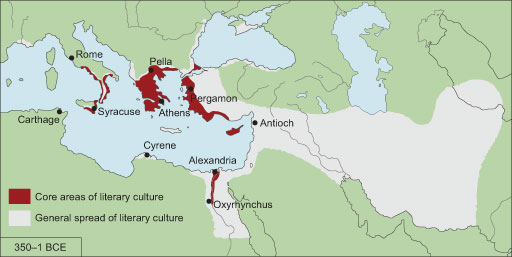1.1 The spread of Greek
The origins of Greek are unknown and probably unknowable. The language is first found on Mycenaean clay tablets dating to around the middle of the second millenium BCE. This makes it the oldest attested European language still in use today. But its history as a language of literature begins not with the written word but with music and performance in the shape of Homer’s Iliad and Odyssey (eighth century BCE) and a great body of ‘lyric’ poetry performed at festivals and symposia (aristocratic drinking parties). At the same time it was also in daily use in Greek settlements across the Aegean sea, the coast of Turkey, Southern Italy, Sicily, North Africa and Asia Minor. But it was the great flowering of Greek literature in the fifth and fourth centuries BCE that established its prestige. This flowering took place chiefly in the theatres of Athens (in the work of the playwrights Aeschylus, Sophocles, Euripides and Aristophanes), its agora (forum) and courtrooms (the orators Lysias and Demosthenes) and its philosophical schools (notably the Academy of Plato). We should also mention the Histories of Herodotus, Thucydides’ History of the Peloponnesian War and its continuation by Xenophon in his Hellēnika (‘Greek events’).
The defeat of the Persian empire by Alexander the Great (356–323 BCE) pushed what was still largely a coastal language further inland, notably in Egypt, the Middle East and Turkey. Crucially for the development of the Greek language, these events also led to the establishment of numerous Greek cities, the most important being Alexandria at the mouth of the river Nile (331 BCE). It was here rather than in mainland Greece that the greatest library of Greek literature was established. Subsequently a more standardised form of Greek developed to take the place of the variety of dialects that had existed to this point. This ‘common dialect’ (koinē dialektos), was heavily influenced by the literature of Athens in the fifth and fourth centuries BCE, making it accessible to a modern reader with some experience of authors from this period, such as the orator Lysias or the philosopher Plato. The most influential works written in koinē Greek are the 27 books of the New Testament.

